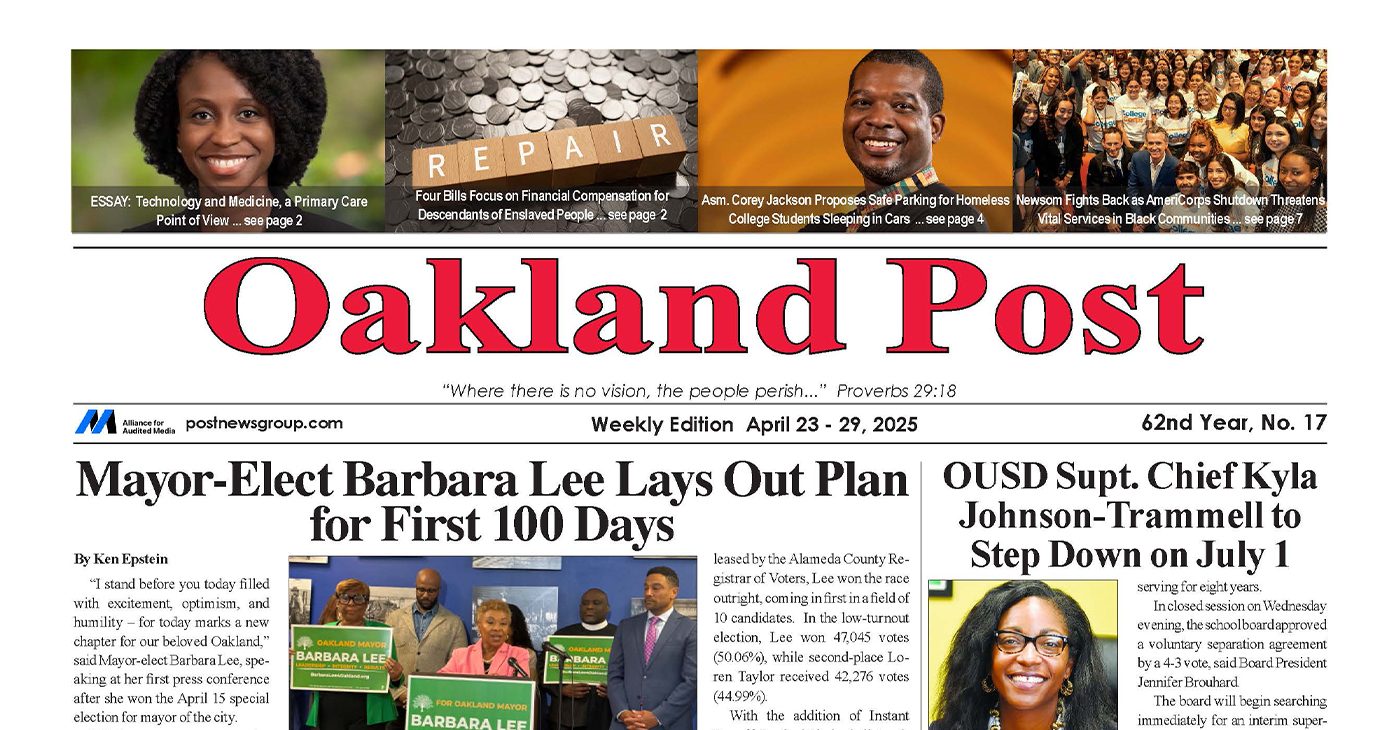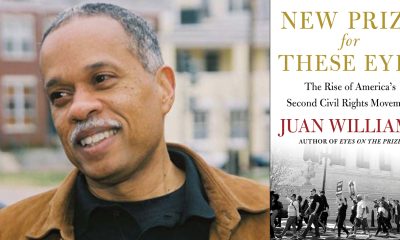News
Opinion – City Must Act on the Voters’ Will to Protect Workers

The city of Oakland must do right by Oakland voters and address racial and economic inequality by ensuring the creation of a strong and effective Department of Workplace and Employment Standards (DWES).
The Department was created by Oakland voters through Measure Z, which passed overwhelmingly with 76% of the vote in November 2018. The law mandates that the City of Oakland establish this department by July 1, 2020, yet the city has been slow on implementation over the last 18 months.
Oakland has been a leader in establishing strong labor standards — with overwhelming voter support. But workers continue to experience violations of their rights due to the lack of robust enforcement. California’s Department of Labor Standards Enforcement estimated that its Oakland-based office has a backlog of 2-2.5 years for wage theft claims. This is unacceptable for workers, and the City has an opportunity to make a difference by standing up the DWES and ensuring adequate funding, structure, and resources to build a home for Oakland workers and support the enforcement body we all voted to enact.
Wage theft is rampant and disproportionately impacts low-wage workers, who in Oakland are predominantly people of color. In California, 19.2% of all low-wage workers experience minimum wage violations, with affected workers losing an average of $3,400 in unpaid wages per year. The workers most impacted by these violations are the same folks our city claims to protect and welcome: Black residents, women, parents, and immigrants. In Oakland, the per capita income is $29,405 for Black families, $20,535 for Latino families, and $35,305 for Asian families – compared to $72,775 for white families, according to census data. Strengthening enforcement of Oakland’s existing laws is one important way to close these gaps.
COVID-19 has demonstrated that some of our lowest paid workers are our most essential. Oakland needs to protect and support workers who are on the front lines of the coronavirus crisis, and are among the hardest hit economically. Enforcing Oakland paid sick days laws will ensure that workers can stay home when they are sick without losing wages or their jobs. This is critical to saving workers lives, slowing the spread, and keeping us all safe.
By setting up the Department, Oakland can play an important role in addressing systemic racial and economic inequality and inequities, and support working families and communities of color by curbing abusive and rampant wage theft, and ensuring that workers’ rights are being upheld. The Department would emulate best practices in labor standards enforcement that have proven effective in other cities. This includes proactively investigating claims of violations of workers’ rights policies and educating workers and employers on local policies that protect and support frontline service workers who hold up our economy.
When all employers follow the law, then businesses have a level playing field. Wage theft can have significant economic and fiscal impacts on local economies and government revenues. Not only are low-wage households more likely to spend their earned income rather than contribute to savings, they are more likely to purchase goods and services from within the local economy. When victims of wage theft spend less money patronizing local businesses, those businesses are forced to cut spending on labor and supplies. One study modeling these ripple effects found that every $1 million in wage theft eradicates 8.6 jobs and $371,000 in local economic spending. Strengthening enforcement of Oakland’s workplace laws will support a swifter and more inclusive economic recovery following the COVID-19 pandemic.
Oakland demands a Department that protects its most vulnerable workers. Workers’ rights are civil rights and human rights. The City already approved funds to help initiate the Department during the 2019 budget cycle. Now the City must officially establish the Department and start the hiring process for the chief officer and make this promise real.
City council is scheduled to vote on two ordinances required to set up the Department of Workforce and Employment Standards on June 9th.
Activism
Oakland Post: Week of April 23 – 29, 2025
The printed Weekly Edition of the Oakland Post: Week of April 23 – 29, 2025

To enlarge your view of this issue, use the slider, magnifying glass icon or full page icon in the lower right corner of the browser window.
#NNPA BlackPress
Chavis and Bryant Lead Charge as Target Boycott Grows
BLACKPRESSUSA NEWSWIRE — Surrounded by civil rights leaders, economists, educators, and activists, Bryant declared the Black community’s power to hold corporations accountable for broken promises.

By Stacy M. Brown
BlackPressUSA.com Senior National Correspondent
Calling for continued economic action and community solidarity, Dr. Jamal H. Bryant launched the second phase of the national boycott against retail giant Target this week at New Birth Missionary Baptist Church in Atlanta. Surrounded by civil rights leaders, economists, educators, and activists, Bryant declared the Black community’s power to hold corporations accountable for broken promises. “They said they were going to invest in Black communities. They said it — not us,” Bryant told the packed sanctuary. “Now they want to break those promises quietly. That ends tonight.” The town hall marked the conclusion of Bryant’s 40-day “Target fast,” initiated on March 3 after Target pulled back its Diversity, Equity, and Inclusion (DEI) commitments. Among those was a public pledge to spend $2 billion with Black-owned businesses by 2025—a pledge Bryant said was made voluntarily in the wake of George Floyd’s murder in 2020.“No company would dare do to the Jewish or Asian communities what they’ve done to us,” Bryant said. “They think they can get away with it. But not this time.”
The evening featured voices from national movements, including civil rights icon and National Newspaper Publishers Association (NNPA) President & CEO Dr. Benjamin F. Chavis Jr., who reinforced the need for sustained consciousness and collective media engagement. The NNPA is the trade association of the 250 African American newspapers and media companies known as The Black Press of America. “On the front page of all of our papers this week will be the announcement that the boycott continues all over the United States,” said Chavis. “I would hope that everyone would subscribe to a Black newspaper, a Black-owned newspaper, subscribe to an economic development program — because the consciousness that we need has to be constantly fed.” Chavis warned against the bombardment of negativity and urged the community to stay engaged beyond single events. “You can come to an event and get that consciousness and then lose it tomorrow,” he said. “We’re bombarded with all of the disgust and hopelessness. But I believe that starting tonight, going forward, we should be more conscious about how we help one another.”
He added, “We can attain and gain a lot more ground even during this period if we turn to each other rather than turning on each other.” Other speakers included Tamika Mallory, Dr. David Johns, Dr. Rashad Richey, educator Dr. Karri Bryant, and U.S. Black Chambers President Ron Busby. Each speaker echoed Bryant’s demand that economic protests be paired with reinvestment in Black businesses and communities. “We are the moral consciousness of this country,” Bryant said. “When we move, the whole nation moves.” Sixteen-year-old William Moore Jr., the youngest attendee, captured the crowd with a challenge to reach younger generations through social media and direct engagement. “If we want to grow this movement, we have to push this narrative in a way that connects,” he said.
Dr. Johns stressed reclaiming cultural identity and resisting systems designed to keep communities uninformed and divided. “We don’t need validation from corporations. We need to teach our children who they are and support each other with love,” he said. Busby directed attendees to platforms like ByBlack.us, a digital directory of over 150,000 Black-owned businesses, encouraging them to shift their dollars from corporations like Target to Black enterprises. Bryant closed by urging the audience to register at targetfast.org, which will soon be renamed to reflect the expanding boycott movement. “They played on our sympathies in 2020. But now we know better,” Bryant said. “And now, we move.”
#NNPA BlackPress
The Department of Education is Collecting Delinquent Student Loan Debt
BLACKPRESSUSA NEWSWIRE — the Department of Education will withhold money from tax refunds and Social Security benefits, garnish federal employee wages, and withhold federal pensions from people who have defaulted on their student loan debt.

By April Ryan
Trump Targets Wages for Forgiven Student Debt
The Department of Education, which the Trump administration is working to abolish, will now serve as the collection agency for delinquent student loan debt for 5.3 million people who the administration says are delinquent and owe at least a year’s worth of student loan payments. “It is a liability to taxpayers,” says White House Press Secretary Karoline Leavitt at Tuesday’s White House Press briefing. She also emphasized the student loan federal government portfolio is “worth nearly $1.6 trillion.” The Trump administration says borrowers must repay their loans, and those in “default will face involuntary collections.” Next month, the Department of Education will withhold money from tax refunds and Social Security benefits, garnish federal employee wages, and withhold federal pensions from people who have defaulted on their student loan debt. Leavitt says “we can not “kick the can down the road” any longer.”
Much of this delinquent debt is said to have resulted from the grace period the Biden administration gave for student loan repayment. The grace period initially was set for 12 months but extended into three years, ending September 30, 2024. The Trump administration will begin collecting the delinquent payments starting May 5. Dr. Walter M. Kimbrough, president of Talladega College, told Black Press USA, “We can have that conversation about people paying their loans as long as we talk about the broader income inequality. Put everything on the table, put it on the table, and we can have a conversation.” Kimbrough asserts, “The big picture is that Black people have a fraction of wealth of white so you’re… already starting with a gap and then when you look at higher education, for example, no one talks about Black G.I.’s that didn’t get the G.I. Bill. A lot of people go to school and build wealth for their family…Black people have a fraction of wealth, so you already start with a wide gap.”
According to the Education Data Initiative, https://educationdata.org/average-time-to-repay-student-loans It takes the average borrower 20 years to pay their student loan debt. It also highlights how some professional graduates take over 45 years to repay student loans. A high-profile example of the timeline of student loan repayment is the former president and former First Lady Barack and Michelle Obama, who paid off their student loans by 2005 while in their 40s. On a related note, then-president Joe Biden spent much time haggling with progressives and Democratic leaders like Senators Elizabeth Warren and Chuck Schumer on Capitol Hill about whether and how student loan forgiveness would even happen.
-

 Activism4 weeks ago
Activism4 weeks agoOakland Post Endorses Barbara Lee
-

 Activism4 weeks ago
Activism4 weeks agoOakland Post: Week of March 28 – April 1, 2025
-

 Activism3 weeks ago
Activism3 weeks agoOakland Post: Week of April 2 – 8, 2025
-

 #NNPA BlackPress3 weeks ago
#NNPA BlackPress3 weeks agoTrump Profits, Black America Pays the Price
-

 Activism2 weeks ago
Activism2 weeks agoOakland Post: Week of April 9 – 15, 2025
-

 #NNPA BlackPress3 weeks ago
#NNPA BlackPress3 weeks agoHarriet Tubman Scrubbed; DEI Dismantled
-

 #NNPA BlackPress3 weeks ago
#NNPA BlackPress3 weeks agoTrump Targets a Slavery Removal from the National Museum of African-American History and Culture
-

 #NNPA BlackPress3 weeks ago
#NNPA BlackPress3 weeks agoLawmakers Greenlight Reparations Study for Descendants of Enslaved Marylanders

























































